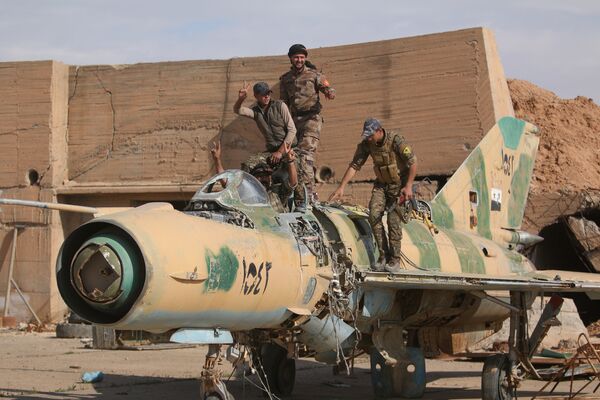On July 6 Spencer Ackerman of the Daily Beast reported that the Trump administration has allegedly introduced a new strategy for Syria.
Citing administration and congressional sources, the journalist elaborated that the new strategy involves allowing Assad to remain in power; acquiescing to the idea of "safe zones" proposed by Russia and its allies; and Russo-American military cooperation to stabilize the situation on the ground "including the use of Russian troops to patrol parts of the country."
Meanwhile, ahead of the first-ever meeting between Russian President Vladimir Putin and his American counterpart, US Secretary of State Rex Tillerson signaled Thursday that Washington is mulling over whether to team up with Russia on Syria.
"The United States and Russia certainly have unresolved differences on a number of issues, but we have the potential to appropriately coordinate in Syria in order to produce stability and serve our mutual security interests," Tillerson said in an official statement.
However, Bagdasarov expresses skepticism about the Trump administration's latest change of heart in Syria.
"It is not the first time that Washington has declared that they are not against the Bashar Assad government. But at the same time (usually) it makes a lot of reservations," Bagdasarov told Radio Sputnik.
For instance, the White House announces that Assad can stay in power if he does not use chemical weapons and then suddenly provocations involving the use of chemical arms occur. The US authorizes would then auntorize strikes against the Syrian government forces, the scholar elaborated.
According to Bagdasarov, it's almost impossible that Washington will ever give up the idea of ousting Syrian President Assad.
What then lies at the root of the current shift?
Bagdasarov believes that the "leaks" concerning the White House's new Syrian strategy indicate an ongoing internal struggle in Washington.
"The infighting between [power] groups is raging on. Perhaps, someone really wants [to reconsider the US stance on Syria] within the State Department, for example. However, the Department of Defense apparently doesn't want this. There are different trends," Bagdasarov told Radio Sputnik.
"At the same time [the US] is creating new military infrastructure in the northwest [region of Syria] and additionally deploying a base in Tabqa, where the largest hydroelectric power station on the Euphrates [is located]. [Washington] is taking Syria's water, oil, gas under its control and simultaneously issues statements on [Russo-American] cooperation," the scholar emphasized.

Boris Dolgov, senior research fellow at the Institute for Oriental Studies at the Russian Academy of Sciences, shares Bagdasarov's concerns.
In his op-ed, Ackerman noted that the US is not going to hand territories taken from Daesh over to Assad. It was reported that the Pentagon would rather cede these territories to its allies on the ground, for example, the Kurdish-dominated Syrian Democratic Forces (SDF).
"If the US takes that step, this will contradict all international norms," Dolgov highlighted, "This will prompt an appropriate response from both the Syrian leadership and its allies. Therefore, in any event, if these actions are taken [by the US], they could further aggravate the conflict."
Dolgov underscored that the US has no legitimacy to hand the Syrian territories retaken from Daesh to the SDF or any other of Washington's allies on the ground.
"Such decisions, if made by the American side are, first, absolutely illegal and illegitimate, since the Syrian leadership headed by President Bashar Assad is a legitimate body and represents the Syrian Arab Republic, and its jurisdiction extends throughout the territory of Syria," the Russian academic stressed.
To complicate matters further, US activity in Syria may lead to the fragmentation of the country, Vladimir Sotnikov, a senior researcher at the Institute of Oriental Studies of the Russian Academy of Sciences (RAS), believes.
Sotnikov pointed out that if the US hands out territories retaken from Daesh to its allies on the ground, Syria will be divided between various military groups.
"If such a decision is made [by Washington], if it takes place, then this will lead only to… the federalization of Syria, and the termination of the existence of Syria as a single unitary state," Sotnikov told RIA Novosti, stressing that, for its part, Moscow calls for maintaining Syria's unity, sovereignty and territorial integrity.






